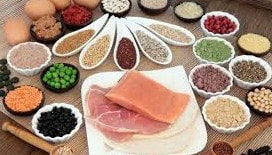|
designfitnesscentre.com
 Protein is not just for great skin, hair, and nails; it's critical for health. Without it, you wouldn't be able to repair damage, digest food, fight infections, build muscle and bone, create hormones, and even think and have good moods. Higher protein diets may help fight high blood pressure, diabetes, and osteoporosis. Not to mention protein's great benefits for metabolism boosting, satiety (feeling full after a meal), and weight management. Protein is important, and this is a given no matter the source (plant or animal). There are a few factors to consider when calculating how much protein we need. We'll go through those calculations along with a list of the amount of protein in some common foods. How much protein is enough There isn’t a real rule that applies equally to everyone. There are a few factors to consider when figuring out how much protein you need. Start with the minimum recommendation of 0.8 g/kg (0.36 g/lb) per day.
Mind you, this is a minimum to prevent protein deficiency. It's not optimal for good repair, digestion, immune function, muscle/bone building, hormones, thinking and great moods. It's not enough for athletes, older adults or those recovering from an injury, either. If you fall into one of these camps, you may need to increase the minimum protein intake. Aim closer to 1.3 g/kg (0.6 g/lb) per day. Athletes need more protein for their energy and muscle mass. Older adults need more to help ward off muscle and bone loss that's common as we age. Injured people need more for recovery and healing. How much protein is too much? As with fat and carbohydrates, eating too much protein can cause weight gain. Extra protein can be converted into sugar or fat in the body - most people don't realize that over eating anything converts to sugar or fat in the body. The interesting thing about protein is that it isn’t as easily or quickly converted as carbohydrates or fat; this is because of its "thermic effect." The thermic effect is the amount of energy required to digest, absorb, transport and store a nutrient. To digest protein, your body needs to spend energy (i.e., burn calories). More calories than when metabolizing fats or carbohydrates. If you’re concerned that high protein intake harms healthy kidneys, consider this. If your kidneys are healthy, they are more than capable of filtering out excess amino acids from the blood. The problem only occurs in people who already have kidney issues. FUN FACT: Plant proteins are especially safe for kidney health. How much protein is in food?
You will need to consider other nutrient values in your protein selection, for example over consuming nuts to up your protein intake may not be the healthiest form due to the fat content. Conclusion Protein is an essential nutrient we should all get enough of. “Enough” is about 0.8 - 1.3 g/kg (0.36 - 0.6 g/lb) per day. If you're a healthy non-athlete adult, you can aim for the lower level. If you're an athlete, older adult, or injured person, aim for the higher level. Too much protein can cause weight gain, so it's best to have just enough. Always best to discuss nutritional changes with your health practitioner to make sure it is right for you. I’d love to know: Are you one of those people who may need more protein? Let me know in the comments. References: http://www.precisionnutrition.com/all-about-protein http://www.health.harvard.edu/healthy-eating/do-you-eat-enough-protein https://authoritynutrition.com/how-much-protein-per-day/
0 Comments
Your comment will be posted after it is approved.
Leave a Reply. |
|
Contact TERRY |
SubscribeJoin our mailing list today!
|
